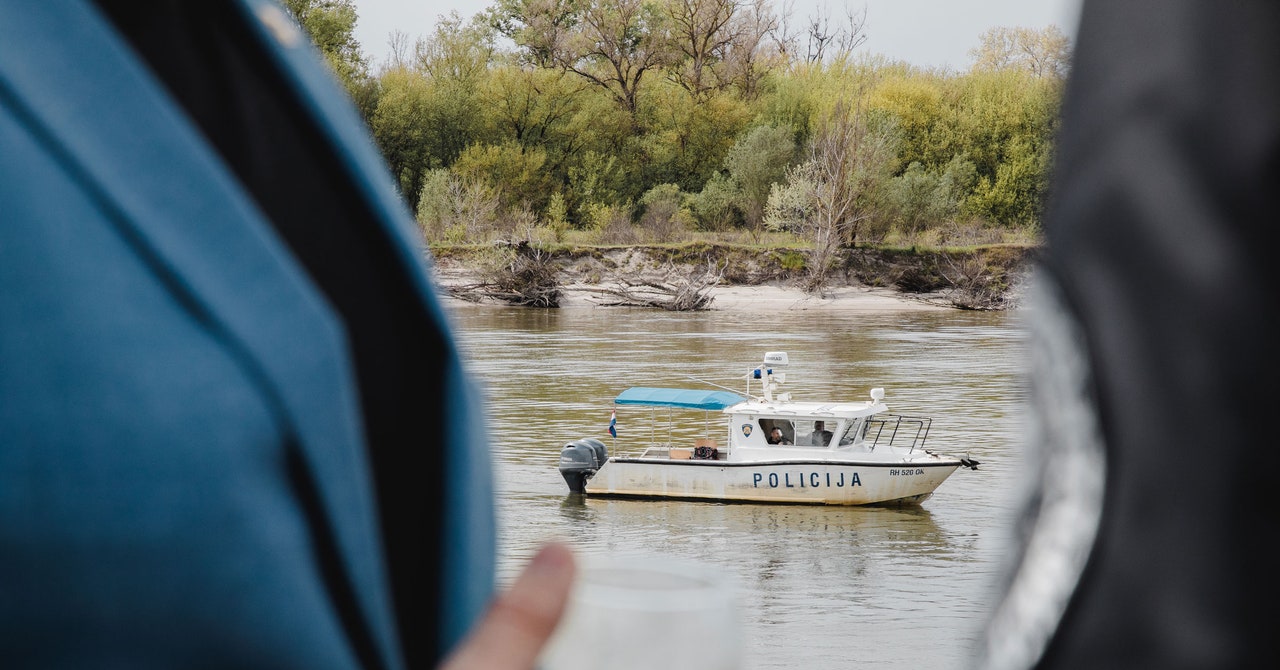Thrown away, the Freedom parked across the river, on the Serbian side, just outside Liberland territory. The passengers disembarked onto a makeshift ramp made of planks and a ladder. The others had already arrived. “Aren’t you arrested yet?” Stern-Vukotic said. “Well, the day is still young.”
Despite the presence of the police, it was a cheerful scene; it was easy to momentarily forget the strangeness of the situation. Davide’s twins had built a fire on the bank and were roasting food on sticks. On the middle deck of Freedom, meat was barbecued and served with salads and bread. Wine from the Liberland brand, made from local grapes, was passed around.
After people finished eating, Jedlička called attention. It was time to hand out their Liberland passports to the newest citizens. The group applauded and shouted as passports were handed over and presidential handshakes accepted, breaking into a chorus of “Lib, lib, lib, lib, lib, lib!” – a chant that came out whenever there was cause for celebration.
For the next month, Freedom remained parked on the other side of the river to Liberland, with someone on board to provide support to the settlers coming down the river from Hungary, and to relay Wi-Fi to anyone who managed to set up camp inland.
The rest of the party returned to Apatin with the other boats, but not before setting foot on Liberland again. A small craft tried to make the crossing, but a police boat led it away from shore, the water spraying into the hull in sharp turns. On this occasion, the would-be settlers were easily repelled.
On the boat driving home, wrapped in a blanket to shelter from the wind, Rubio, the ex-pastor, sat pondering. Despite all the festivities, he had spent the weekend worrying about Liberland’s future. “Where are all the followers?” he asked.
It was a valid observation. Of the 70 to 80 people at the anniversary, few were not directly affiliated with the Liberland government. After counting the president and his cabinet, the delegates and the speakers, Rubio was one of the few “followers” who had made the journey. According to Jedlička’s calculation, only about 300 people have ever set foot on Liberland soil.
Part of the problem is the emphasis on crypto, Rubio believes, which threatens to alienate those for whom Liberland is primarily a political enterprise. ‘I found the idea of Liberland attractive – the romantic idea of freedom and living in peace. But they center the message in technology,” says Rubio. “It’s part of the bones, the skeleton, but you need the heart.” If Jedlička wants to attract the support of libertarians, Rubio said, he should openly preach the new country’s values on social media. After all, nation-building calls for activism and careful refueling.
But Liberland, like previous crypto projects, may not be able to count on its founder to carry it on forever. Although Jedlička has promised to devote his full energies to Liberland, at least until “things are really on track”, he has bigger ambitions. “I’m quite excited about space exploration,” he said, “and the field of longevity.”
“I think Liberland would survive without me. But of course it would lose momentum,” continued Jedlička. “I will do my best to ensure that Liberland is the first to be recognized internationally.”
As the boats headed back through Serbian waters, they passed the ruin of a larger boat, abandoned at the mouth of Apatin Marina. The fallen ship, also owned by the Liberlandians, had caught fire, sunk and been sold for scrap. The wreck lay sideways, the lower deck almost completely submerged. Rubio gestured to the wreckage, “I hope this isn’t a premonition for Liberland.”
This article appears in the September/October 2023 edition of WIRED UK.

